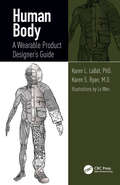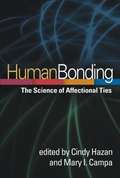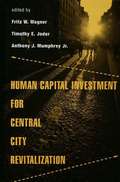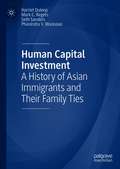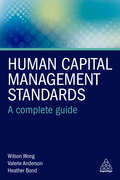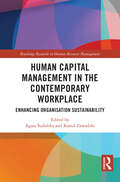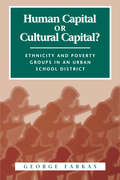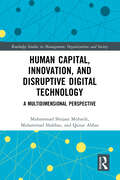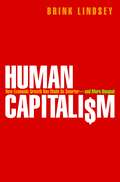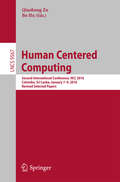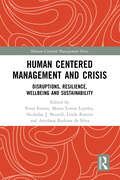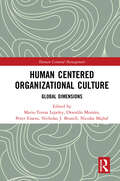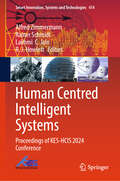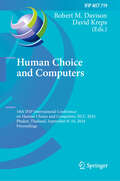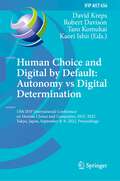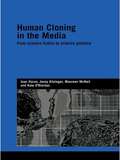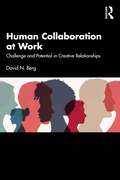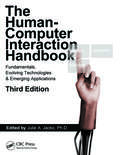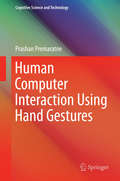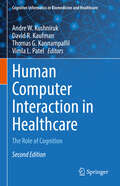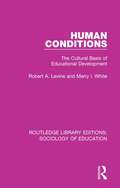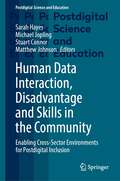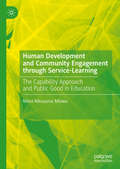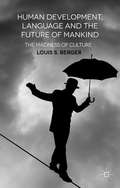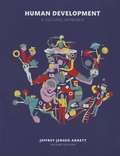- Table View
- List View
Human Body: A Wearable Product Designer's Guide
by Karen L. LaBat Karen S. RyanHuman Body: A Wearable Product Designer's Guide, unlike other anatomy books, is divided into sections pertinent to wearable product designers. Two introductory chapters include many definitions, an introduction to anatomical terminology, and brief discussions of the body's systems, setting the stage for the remaining chapters. The book is extensively referenced and has a large glossary with both anatomical and design terms making it maximally useful for interdisciplinary collaborative work. The book includes 200 original illustrations and many product examples to demonstrate relationships between wearable product components and anatomy. Exercises introduce useful anatomical, physiological, and biomechanical concepts and include design challenges. Features Includes body region chapters on head and neck, upper torso and arms, lower torso and legs, the mid-torso, hands, feet, and a chapter on the body as a whole Contains short sections on growth and development, pregnancy, and aging as well as sections on posture, gait, and designing total body garments Describes important regional muscles and their actions as well as joint range of motion (ROM) definitions and data with applications to designing motion into wearable products Presents appendices correlating to each body region’s anatomy with instructions for landmarking and measuring the body, a valuable resource for a lifetime of designing
Human Bonding
by Cindy Hazan Mary I. CampaThis tightly edited volume provides an integrative overview of human bonding from infancy through adulthood. Through an attachment lens, the book synthesizes classic and cutting-edge research on close relationships and their profound impact in everyday life. Topics include infant-caregiver attachment, human social nature, child and adolescent social development, mate selection, love and sexual desire, hooking up and online dating, keys to relationship success, predictors and consequences of relationship dissolution, and the role of social connectedness in psychological adjustment and physical health. Readers get a solid grounding in the concepts, theories, and methods that define contemporary relationship science.
Human Capital Investment for Central City Revitalization (Contemporary Urban Affairs)
by Fritz W. Wagner Timothy E. Joder Anthony J. Mumphrey Jr.Viewing poverty as a condition that is fed and renewed on a daily basis by social and economic structures, this book focuses on the ways in which poor residents can be helped to improve their own situations, their living conditions, and the central city itself. Also includes four maps.
Human Capital Investment: A History of Asian Immigrants and Their Family Ties
by Phanindra V. Wunnava Harriet Duleep Mark C. Regets Seth SandersIn 1965, a family-reunification policy for admitting immigrants to the United States replaced a system that chose immigrants based on their national origin. With this change, a 40-year hiatus in Asian immigration ended. Today, over three-quarters of US immigrants originate from Asia and Latin America. Two issues that dominate discussions of US immigration policy are the progress of post-reform immigrants and their contributions to the US economy. This book focuses on the earnings and human capital investment of Asian immigrants to the US after 1965. In addition, it provides a primer on studying immigrant economic assimilation, by explaining economists’ methodology to measure immigrant earnings growth and the challenges with this approach. The book also illustrates strategies to more fully use census data such as how to measure family income and how to use “panel data” that is embedded in the census. The book is a historical study as well as an extremely timely work from a policy angle. The passage of the 1965 Immigration and Nationality Act set the United States apart among economically developed countries due to the weight given to family unification. Based on analyses by economists—which suggest that the quality of immigrants to the US fell after the 1965 law—policymakers have called for fundamental changes in the US system to align it with the immigration systems of other countries. This book offers an alternative view point by proposing a richer model that incorporates investments in human capital by immigrants and their families. It challenges the conventional model in three ways: First, it views the decline in immigrants’ entry earnings after 1965 as due to investment in human capital, not to permanently lower “quality.” Second, it adds human capital investment and earnings growth after entry to the model. And finally, by taking investments by family members into account, it challenges the policy recommendation that immigrants should be selected for their occupational qualifications rather than family connections.
Human Capital Management Standards: A Complete Guide
by Valerie Anderson Dr Wilson Wong Heather BondHuman Capital Management Standards is a complete guide to the BSI and ISO frameworks for human resources. Providing definitions, best practice guidance and evaluation metrics, this book will ensure that HR professionals are fully compliant with both UK and global HR frameworks. Covering everything from workforce planning and organizational culture to employee engagement, recruitment and redundancy, this book provides advice on all the key areas of an HR professional's role throughout the employee lifecycle from initial hire to exit. There is also additional coverage of the business standards which overlap with the human capital frameworks including governance, business continuity and ethics. Human Capital Management Standards will allow HR departments to implement effective people policies and processes based on robust research to create a supportive business environment and a productive workforce. This book also includes essential coverage of the standards assessment process and hints, tips and advice on how to achieve successful accreditation. With case studies from organizations who have made HR interventions based on these standards and a glossary to explain the language of standards, this is an indispensable guide for HR professionals in all organizations.
Human Capital Management in the Contemporary Workplace: Enhancing Organisation Sustainability (Routledge Research in Human Resource Management)
by Agata Sudolska and Kamil ZawadzkiNowadays, organisations are confronted with the imperative to enhance their organisational sustainability. This involves establishing an appropriate balance between the economic, ecological, and social aspects of an organisation's operations and striving to accomplish their economically viable goals that are both socially and environmentally responsible. By aligning the priorities and incorporating environmental, social, and economic factors into their operational strategies, organisations can generate value for themselves, while also making a positive impact on the current and future welfare of society and the environment. Noticeably, the advancement of organisational sustainability relies heavily on human capital management in the workplace.Today, more than ever, human capital is regarded as the foundation of organisations and ought to be treated as such. Given the pivotal role of human capital management for ensuring the long-term organisational sustainability of an organisation, emphasis should be placed on redefining leadership strategies and priorities, focusing on diversity and inclusion, cultivating talent, facilitating remote work, fostering employee engagement, promoting skill development for environmentally friendly practices, and prioritising job satisfaction and employee well-being.In response to the multi-faceted challenges of the third decade of the 21st century, this book provides an in-depth review of research avenues addressing present and future human capital development concerns in terms of enhancing organisation sustainability. The main aim of the book is to indicate the direction of demand for new competences regarding workplace human capital and identify synergies between its particular aspects with reference to contemporary human capital development. The monograph’s objectives include presenting tools that allow the analysis and development of human capital competences, pro-active and pro-environmental attitudes and behaviours, the coexistence of workers and AI in the organisation, as well as providing employee well-being, satisfaction, and commitment. Moreover, the book offers recommendations for contemporary responsible organisations that carry themselves towards the new economic and social order and sustainability.
Human Capital or Cultural Capital?: Ethnicity and Poverty Groups in an Urban School District (Social Institutions And Social Change Ser.)
by George FarkasThis study seeks to reorient our understanding of the early educational determinants of social stratification outcomes. It focuses on the process and consequences of unequal cognitive skill attainment for ethnic and poverty groups within our nation's cities. It draws, theoretically, on the notion that experiences at home and school create a feedback loop by which the ""cultural capital"" of the students (their toolkit of skills, habits, and styles with which they construct strategies of action) evolves over time and largely determines differential success in mastering the teacher-assigned homework.
Human Capital, Innovation and Disruptive Digital Technology: A Multidimensional Perspective (Routledge Studies in Management, Organizations and Society)
by Muhammad Shahbaz Qaisar Abbas Muhammad Shujaat MubarikHuman capital appears to be at the core of business strategies helping firms to recover from the catastrophic effects of COVID19 and bounce back effectively. The book in hand provides a diverse view of the human capital, its multifaceted role and application in an organization. The book also offers a comprehensive analysis on the role of human capital in industry 4.0, firm internationalization, and organizational ambidexterity and outlines strategies for the firm to improve its human capital readiness, keeping in view the contemporary business dynamics. A very simple and focused approach has been adopted through the book to make it readable for the people from the diverse fields. The book also focuses upon the conceptualizations and measurements of human capital in order to offer conceptual clarity of human capital to readers. A central focus of the book is how human capital interacts with and complements other organizational resources and technological developments. The book will be extremely useful for top-tier managers, researchers, academicians, consultants, and practitioners interested in gaining a current, relevant, and diverse perspective on human capital, its dimensions, and development.
Human Capitalism: How Economic Growth Has Made Us Smarter--and More Unequal
by Brink LindseyWhy the rich are getting smarter while the poor are being left behindWhat explains the growing class divide between the well educated and everybody else? Noted author Brink Lindsey, a senior scholar at the Kauffman Foundation, argues that it's because economic expansion is creating an increasingly complex world in which only a minority with the right knowledge and skills—the right "human capital"—reap the majority of the economic rewards. The complexity of today's economy is not only making these lucky elites richer—it is also making them smarter. As the economy makes ever-greater demands on their minds, the successful are making ever-greater investments in education and other ways of increasing their human capital, expanding their cognitive skills and leading them to still higher levels of success. But unfortunately, even as the rich are securely riding this virtuous cycle, the poor are trapped in a vicious one, as a lack of human capital leads to family breakdown, unemployment, dysfunction, and further erosion of knowledge and skills. In this brief, clear, and forthright eBook original, Lindsey shows how economic growth is creating unprecedented levels of human capital—and suggests how the huge benefits of this development can be spread beyond those who are already enjoying its rewards.
Human Centered Computing
by Bo Hu Qiaohong ZuThis book constitutes revised selected papers from thethoroughly refereed proceedings of the Second International Human CenteredComputing Conference, HCC 2016, that consolidated and further develops thesuccessful ICPCA/SWS conferences on Pervasive Computing and the NetworkedWorld, and which was held in Colombo, Sri Lanka, in January 2016. The 58 full papers and 30 short papers presented in thisvolume together with one keynote talk were carefully reviewed and selected from211 submissions. These proceedings present research papers investigating into avariety of aspects towards human centric intelligent societies. They cover thecategories: infrastructure and devices; service and solution; data andknowledge; and community.
Human Centered Management and Crisis: Disruptions, Resilience, Wellbeing and Sustainability (Human Centered Management)
by Nicholas J. Beutell Maria-Teresa Lepeley Peter Essens Linda Ronnie da Silva, Anielson BarbosaHuman Centered Management and Crisis: Disruptions, Resilience, Wellbeing and Sustainability is the new edited book of the Human Centered Management (HCM) Series developed to respond to surmounting concerns of global audiences and human centered scholars, practitioners and students searching for answers to better and objectively understand the effects of unprecedented Covid-19 pandemic disruptions and ongoing crises, affecting the wellbeing of people and workplaces since 2019. The effects linger and solutions are pressing. This new HCM volume presents analytical expertise and practical experiences of a team of international HCM scholars and practitioners targeting objective assessment of causes and effects of disruptions and offering coherent solutions applying HCM principles and practices. The book chapters include topics dealing with specific problem-solving strategies in numerous industries, among them, higher education, health care and entrepreneurship. The book will help readers worldwide to understand the challenges people and organizations are facing in the present global VUCA (volatile, uncertain, complex, ambiguous) environment. The audience will benefit from the book and its purpose to deliver enduring HCM solutions anchored in the wellbeing of people as precondition for organizations to secure high performance, quality standards and long-term sustainability.
Human Centered Organizational Culture: Global Dimensions (Human Centered Management)
by Maria-Teresa LepeleyThis book is part of the Human Centered Book Trilogy, the 2021 volumes of the Routledge Human Centered Management HCM Series. HCM books are pioneering transformation from the traditional humans-as-a-resource approach of the industrial past, to the humans at the center management and organizational paradigm of the 21st century. HCM is built on talent and wellbeing of people in the workplace driving work engagement, quality standards, high performance and productivity for long-term organizational sustainability in the global VUCA (volatile, uncertain, complex, ambiguous) environment. This book was carefully crafted by recognized international human centered scholars from four continents. Although all organizations seek to have an optimal culture, unstoppable disruptions in the VUCA environment easily derail even the best efforts. Conventional assumptions of culture as a unifying organizational force are hardly defendable today. HCM maintains that culture is not only about cohesiveness and consensus but effective management of conflict and disagreements continuously testing the capacity of people to work together. This book is about organizational transformation positioning people at the center. Complementary chapters integrate as antidotes to overcome disruptions in the VUCA environment and the effects of the COVID-19 pandemic affecting people and organizations worldwide. This and its two complementary titles Soft Skills for Human Centered Management and Global Sustainability and Sensible Leadership: Human Centered, Insightful and Prudent are timely readings for leaders, managers, researchers, academics, practitioners, students and the general public responsible for organizations across industries and sectors worldwide pursuing quality standards and organizational transformation to attain sustainability.
Human Centred Intelligent Systems: Proceedings of KES-HCIS 2024 Conference (Smart Innovation, Systems and Technologies #414)
by Lakhmi C. Jain Rainer Schmidt Alfred Zimmermann R. J. HowlettThe volume includes papers presented at the International KES Conference on Human Centred Intelligent Systems 2024 (KES HCIS 2024), held in Madeira, Portugal on June 19–21, 2024. This book highlights new trends and challenges in intelligent systems, which play an important part in the digital transformation of many areas of science and practice. It includes papers offering a deeper understanding of the human-centred perspective on artificial intelligence, of intelligent value co-creation, ethics, value-oriented digital models, transparency, and intelligent digital architectures and engineering to support digital services and intelligent systems, the transformation of structures in digital businesses and intelligent systems based on human practices, as well as the study of interaction and the co-adaptation of humans and systems.
Human Choice and Computers: 16th IFIP International Conference on Human Choice and Computers, HCC 2024, Phuket, Thailand, September 8–10, 2024, Proceedings (IFIP Advances in Information and Communication Technology #719)
by David Kreps Robert M. DavisonThis book constitutes the refereed proceedings of the 16th IFIP International Conference on Human Choice and Computers, HCC 2024, held in Phuket, Thailand, during September 8–10, 2024. The 9 full papers presented in this book were carefully reviewed and selected from 17 submissions. Summaries of 2 keynote presentations are also included. This papers focus on Humans, Technological Innovations and Artificial Intelligence: Opportunities and Consequences.
Human Choice and Digital by Default: 15th IFIP International Conference on Human Choice and Computers, HCC 2022, Tokyo, Japan, September 8–9, 2022, Proceedings (IFIP Advances in Information and Communication Technology #656)
by David Kreps Robert Davison Taro Komukai Kaori IshiiThis book constitutes the refereed proceedings of the 15th IFIP TC 9 International Conference on Human Choice and Computers, HCC15 2022, in Tokyo, Japan, in September 2022.The 17 full papers presented were carefully reviewed and selected from 32 submissions. Summaries of 2 keynote presentations are also included. The papers deal with the constantly evolving intimate relationship between humans and technology.
Human Cloning in the Media: From Science Fiction To Science Practice (Genetics And Society Ser.)
by Jenny Kitzinger Kate O'Riordan Maureen McNeil Joan HaranThis book provides an intensive exploration of recent popular representations of human cloning, genetics and the concerns which they generate and mobilise. It is a timely contribution to current debates about the public communication of science and about the cultural and political stakes in those debates. Taking the UK as its main case study, with cross-cultural comparisons with the USA and South Korea, the book explores the proposition that genomics is ‘the publicly mediated science par excellence’, through detailed reference to the rhetoric and images around human reproductive and therapeutic cloning which have proliferated in the wake of the ‘completion’ of the Human Genome Project (2000). The book offers a set of distinctive analyses of media and cultural texts – including press and television news, Hollywood and independent film drama, documentaries, art exhibits and websites – and in dialogue with the producers and consumers of these texts. From these investigations, key issues are foregrounded: the image of the scientist, scientific expertise and institutions; the governance of science; the representation of women’s bodies as the subjects and objects of biotechnology; and the constitution of publics, both as objects of media debate, and as their intended audience. This examination demonstrates the importance of mediation, media institutions, and media texts in the production of scientific knowledge. Countering models that see ‘the media’ as simply a channel through which scientific knowledge passes, this book will emphasise the importance of communications technologies in the production of modern scientific knowledge and their particular significance in contemporary genomics. It will argue that human genomic science – and cloning as its current iconic manifestation – has to be understood as a complex cultural production.
Human Collaboration at Work: Challenge and Potential in Creative Relationships
by David N. BergHuman Collaboration at Work delves into the dynamics of collaboration between two individuals, examining both the challenges and potential in creative relationships and offering a useful resource for all those working with others. The two-person relationship is one of the key building blocks in our understanding of relationships in organizations yet is largely understudied in the literature.This book brings the dyadic relationship to the fore and offers support for those engaging in collaborative relationships in the workplace and beyond. The author reframes challenges as opportunities for partners to leverage their differences and overcome potential conflicts. Through this lens, he provides a nuanced understanding of the interpersonal and contextual factors that influence collaboration.Supported by compelling real-life examples, including the author’s own long-term working relationship with a colleague, this book is an essential guide for those in leadership roles, managers, consultants, and academics alike – anyone seeking to enhance their collaborative relationships in professional settings.
Human Computer Interaction Handbook: Fundamentals, Evolving Technologies, and Emerging Applications, Third Edition (Human Factors and Ergonomics)
by Julie A. JackoWinner of a 2013 CHOICE Outstanding Academic Title Award The third edition of a groundbreaking reference, The Human-Computer Interaction Handbook: Fundamentals, Evolving Technologies, and Emerging Applications raises the bar for handbooks in this field. It is the largest, most complete compilation of HCI theories, principles, advances, case st
Human Computer Interaction Using Hand Gestures
by Prashan PremaratneHuman computer interaction (HCI) plays a vital role in bridging the 'Digital Divide', bringing people closer to consumer electronics control in the 'lounge'. Keyboards and mouse or remotes do alienate old and new generations alike from control interfaces. Hand Gesture Recognition systems bring hope of connecting people with machines in a natural way. This will lead to consumers being able to use their hands naturally to communicate with any electronic equipment in their 'lounge. ' This monograph will include the state of the art hand gesture recognition approaches and how they evolved from their inception. The author would also detail his research in this area for the past 8 years and how the future might turn out to be using HCI. This monograph will serve as a valuable guide for researchers (who would endeavour into) in the world of HCI.
Human Computer Interaction in Healthcare: The Role of Cognition (Cognitive Informatics in Biomedicine and Healthcare)
by Vimla L. Patel Thomas G. Kannampallil David R. Kaufman Andre W. KushnirukThis thoroughly updated edition reports on the current state of human computer interaction (HCI) in biomedicine and healthcare, focusing on the cognitive underpinnings of human interactions with people and technology. With health information technologies becoming increasingly vital tools for the practice of clinical medicine, this book draws from key theories, models and evaluation frameworks, and their application in biomedical contexts to apply this to current research in HCI. However, numerous challenges remain in order to fully realize their potential as instruments for advancing clinical care and enhancing patient safety. There is a general consensus that health IT has not realized its potential as a tool to facilitate clinical decision-making, the coordination of care and improvements in patient safety. Embracing sound principles of iterative design can yield significant dividends. It can also enhance practitioner’s abilities to meet “meaningful use” requirements. The purpose of the book is two-fold: to address key gaps on the applicability of theories, models and evaluation frameworks of HCI and human factors for research in biomedical informatics. It highlights the state of the art, drawing from the current research in HCI. It also serves as a graduate level textbook highlighting key topics in HCI relevant for biomedical informatics, computer science and social science students working in the healthcare domain. Cognitive Informatics for Biomedicine: Human Computer Interaction in Healthcare is indispensable to those who want to ensure that the systems they build, and the interactive environments that they promote, will reflect the rigor and dedication to human-computer interaction principles that will ultimately enhance both the user’s experience and the quality and safety of the care that is offered to patients. It is an essential reference to all who are interested in the application of these new techniques within healthcare, from students of informatics through to clinicians, informatics researchers and developers of health IT looking to incorporate them into their day-to-day workflow.
Human Conditions: The Cultural Basis of Educational Developments (Routledge Library Editions: Sociology of Education #32)
by Merry I. White Robert A LevineFirst published in 1986, this book proposes and illustrates a new approach to the comparative analysis of educational policy, based on anthropological and historical inquiry. It reviews the transitions of Western countries, Japan, and the People’s Republic of China and in doing so investigates cultural ideas of human potential and how they inform social and economic goals of education. An analysis of the problems and emerging patterns in developing countries reveals how and why the meanings of life for the majority of their populations were still influenced by agrarian cultural models, even after the introduction of new educational and occupational careers. In place of universalistic economic models and homogenous modernization strategies, the authors propose that culture-specific meanings of education are determined by each country’s particular transition from its agrarian past to its socio-economic conditions at the time. They argue that change in educational development has been as varied in ends, means and significance outcomes as the cultures in which it has occurred and point to the need for a deeper understanding of cultural contexts in which policy choices and development plans are made.
Human Data Interaction, Disadvantage and Skills in the Community: Enabling Cross-Sector Environments for Postdigital Inclusion (Postdigital Science and Education)
by Sarah Hayes Matthew Johnson Stuart Connor Michael JoplingThe book provides a dynamic, cross-sectional, multidisciplinary perspective and dialogue to illuminate the challenges humans face in their interactions with data in their individual postdigital contexts in local communities. It offers unique insights from real cases, collaborations, and projects to extend existing academic theories and frameworks, applied to human data interactions, disadvantage, and digital skills. The book takes the novel approach of establishing co-authorship between cross-sector practitioners from the wider community (such as local authorities, councils, policy makers, small businesses, charities, education and skills providers, and other stakeholders) with international academics and researchers who write about humans, digital skills, and data. This develops an enabling cross-sector environment throughout the book that not only furthers broader understandings concerning data, disadvantage and digital skills in postdigital society, but also shares a template to support others who may wish to adopt this approach to co-authorship and knowledge exchange.The book revisits the Human Data Interaction (HDI) framework (Mortier, Haddadi, Henderson, McAuley, and Crowcroft 2014) through many diverse cross-sectoral perspectives. These are co-authored under the HDI framework’s key tenets of: agency, legibility, negotiability and resistance. These tenets form the main sections of the book, with chapters examining these concepts through both interdisciplinary academic literature and cross-sector dialogue with individuals and agencies from the wider community who work with diverse and often disadvantaged groups.
Human Development and Community Engagement through Service-Learning: The Capability Approach and Public Good in Education
by Ntimi Nikusuma MtawaThis book establishes community engagement and service-learning as pathways to advancing human development and common good. Using the human development and capability approach as normative frameworks, with South Africa as a frame of reference, the author investigates the theoretical contributions and ultimate benefits of university-community partnerships. In doing so, this book demonstrates that three interrelated capabilities – affiliation, common good professionals and local citizenship – are developed through community engagement and service-learning. Subsequently, the notion of transformative change through community engagement and service-learning is illuminated, particularly when operating within the context of power differentials, inequality and extreme poverty. This book will be of interest and value to students and scholars of service-learning, and its implications for partnerships between universities and external communities.
Human Development, Language and the Future of Mankind
by Louis S. BergerDrawing on and integrating unorthodox thought from a broad range of disciplines including clinical psychology, linguistics, philosophy, natural science and psychoanalysis, this book offers a provocative, original analysis of the global threats to our survival, and proposes a remedy.
Human Development: A Cultural Approach
by Jeffrey ArnettHelp students understand how culture impacts development – and why it matters Human Development: A Cultural Approach, Second Edition leads students to examine all stages of development through the engaging lens of culture. The first author to take a wholly cultural approach to human development, Jeffrey Arnett integrates cross-cultural examples throughout the narrative to reveal the impact of cultural factors both in the US and around the world. Arnett’s emphasis on culture fosters a thorough, balanced view of development that prepares students to face challenges in our diverse and globalized world – whether they travel the globe or remain in their hometowns.
